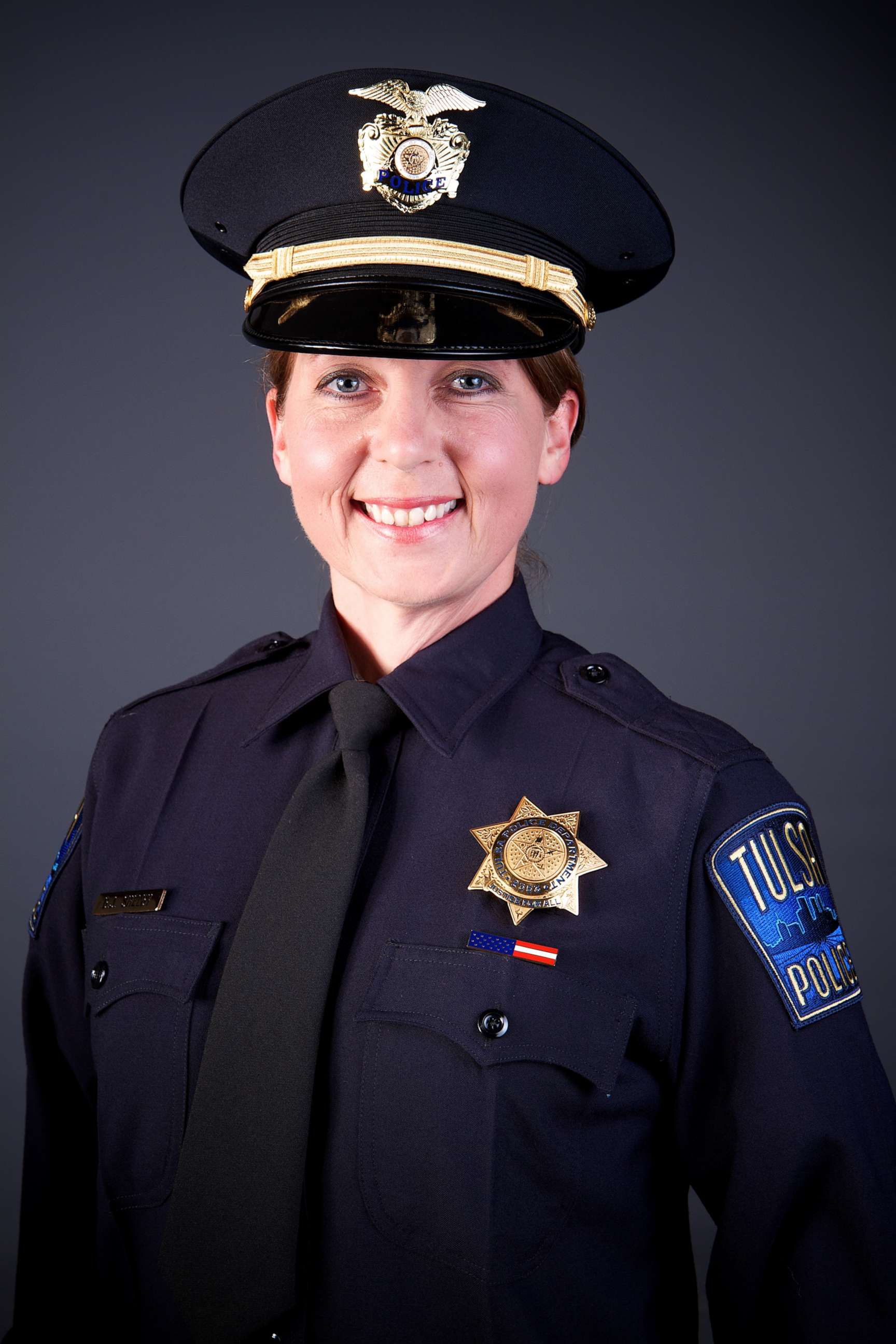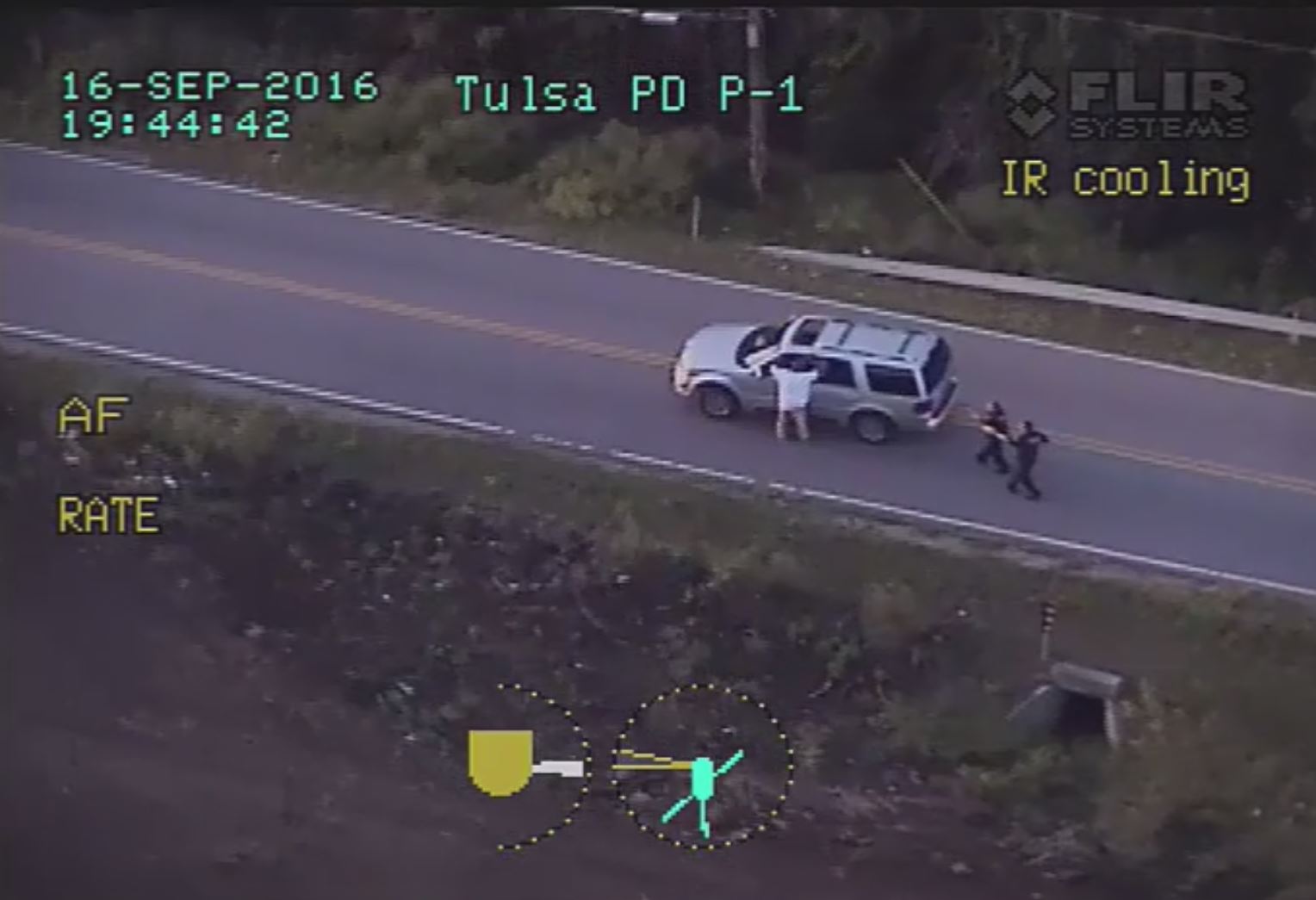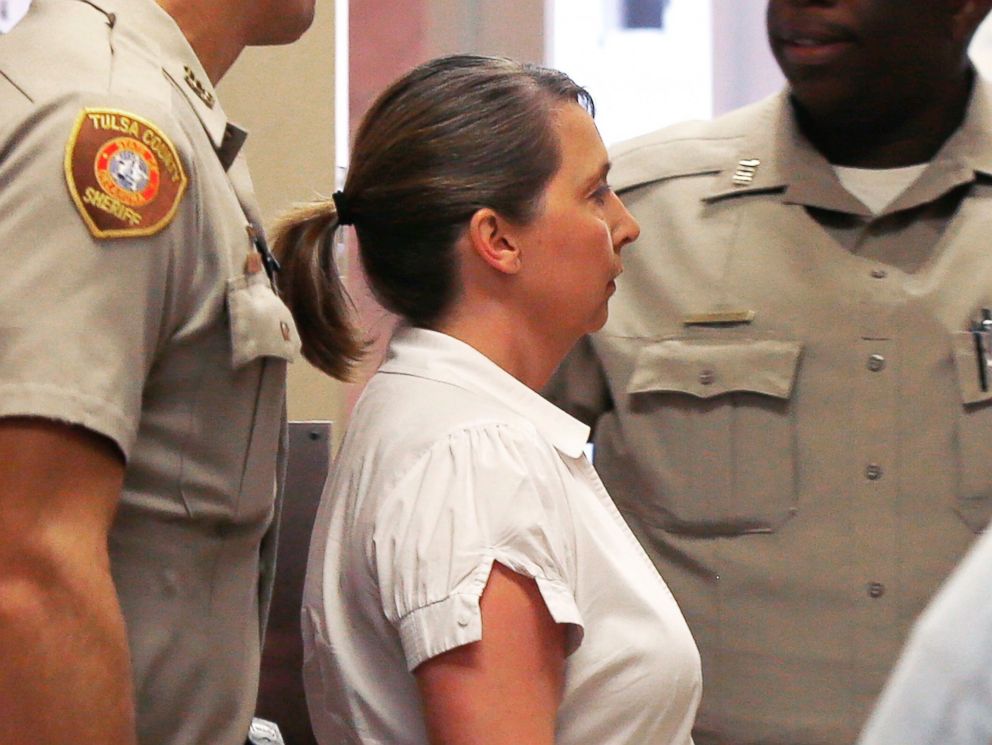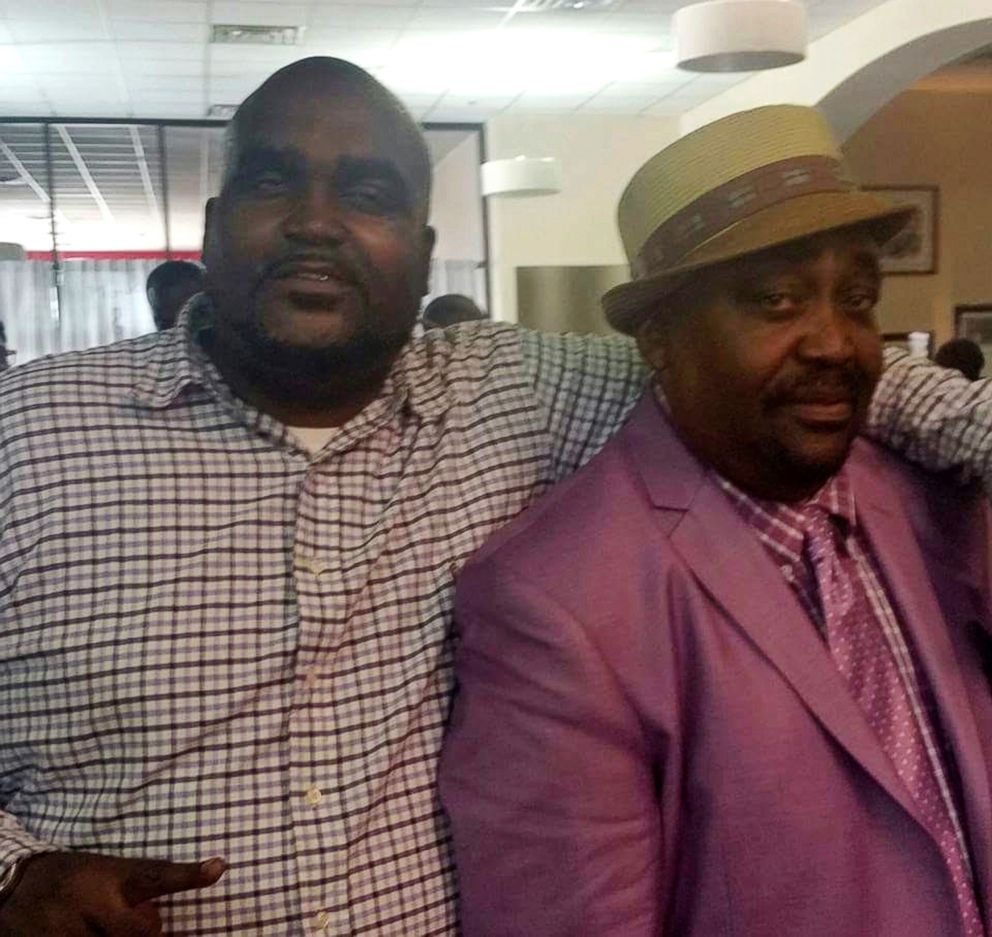Officer who killed unarmed black man responds to critics of her 'critical incident' course
An officer who killed an unarmed man is teaching "critical incident" course.
A white Oklahoma officer, who was acquitted of manslaughter charges in the fatal 2016 shooting of an unarmed African-American man, defended herself amid protests that have erupted over her teaching a class to sheriff's deputies.
"I talk about the challenges that I face after my critical incident; the challenges that my husband and I were not prepared for," former Tulsa police officer Betty Shelby told "Good Morning America" in an exclusive interview of what her classes entail.
"So I take what I learned and developed what I call tools and I pass that on to other officers so maybe they can be better prepared to deal with a critical incident."
Despite the demonstrations this week, Shelby, now a nearby sheriff’s deputy, went ahead Tuesday with the scheduled class titled "Surviving the Aftermath of a Critical Incident," attended by about two dozen Tulsa County sheriff's deputies, officials said.
The "critical incident" does not solely refer to an officer-involved shooting, Shelby said, but can be an event that simply "tests the limits of their coping skills."
"It can be an officer who responds to a hostage situation or saw a very severe car accident where a child died,” she told “GMA.”
“It can be an array of things. An officer can see many critical incidents throughout their career. We are well-trained in how to use the tools that we're given but what we're not prepared for are the events afterwards.
"Of course, it’s critical to the person that's involved but it may affect people differently," Shelby, who is not paid for teaching the classes, added.

Shelby was arrested and charged two years ago with first-degree manslaughter in the shooting death of Terence Crutcher, 40, after she came across an idling SUV stopped in the middle of a two-lane roadway and spotted Crutcher walking toward the vehicle.
Police dashcam and helicopter video showed Crutcher with his hands in the air as Shelby and other officers approached him with their guns pointed at him. Crutcher can be seen in the video lowering his hands and apparently attempting to reach into the vehicle when Shelby opened fire, killing him.
Lawyers for Crutcher's family maintain that the vehicle window Crutcher appeared to be reaching into was rolled up at the time. But Shelby's attorney says that Shelby claims the window was rolled down and Crutcher appeared to be reaching into the SUV.
Authorities determined that no weapons were found on Crutcher or inside his vehicle.
Shelby went to trial on manslaughter charges and a jury acquitted her in August 2017, prompting outrage from the African-American leaders in Tulsa and angry protests in the city's streets.
"There was a moment when I was told 'I'll never be in law enforcement again,' even if I win this case," Shelby said.
After the acquittal, Shelby returned to the Tulsa police force with back pay. She has since gotten a new job as a sheriff’s deputy in neighboring Rogers County.
Asked what she would say to Crutcher's family, Shelby said she wants the focus to be on "healing."
"Let's start healing ... let's take the steps to heal, and take a step forward in the right direction, and not only do we heal ourselves but our community starts healing,” she said. “And when our community starts healing, then our nation starts healing.”
Shelby said she was not prepared for what would happen after the trial.
"I had to emotionally deal with being involved in a shooting where someone died,” she said. “I had to physically deal with leaving my home unexpectedly due to threats.”
For Crutcher's twin sister, Dr. Tiffany Crutcher, this was all created by Shelby's actions.
"Terence had his hands in the air, he was moving slowly and he was not the aggressor," Crutcher told "GMA." "He took his last breath alone and no one provided first aid."
When told of Shelby's comments about "healing," Crutcher said, "Well, she never reached out to us to apologize."

Word of Shelby’s teaching such a class in Tulsa ignited protests Monday outside the Civic Center in the city's downtown area, where one demonstrator, Marq Lewis, called the move "a slap in the face to all African-Americans."
"The reason this is a slap in our faces is that they're putting it in our faces and they're saying to us, 'It's fine, deal with it. We don't care how insensitive it is. We're going to have this class and it's OK,'" Lewis, leader of the grass-roots civil rights group, We the People Oklahoma, said Tuesday morning.
"These are our tax dollars that are being put to use to have this class for other law enforcement officers," Lewis told ABC News. "It's almost as if we, as citizens, don't have a say in saying that we don't want this class going forth."
We the People Oklahoma, in a statement to "GMA," made reference to a letter from jurors at Shelby's trial that questioned her ability to serve as a law enforcement officer.
"Is THAT really who TCSO believes should be instructing other officers on anything, especially something as vital as officer-related shootings? Just because Shelby managed to beat the system?" according to the statement.
Crutcher's sister is also outraged by the news of Shelby’s teaching fellow officers.
"It's insulting and has deepened the divide in our community," Crutcher said.

Shelby's course, which she teaches outside her regular duties as a sheriff’s deputy, ran from 8:30 a.m. to about 12:30 p.m. Tuesday. She was expected to "describe some of the challenges" that arise after a critical incident, such as officer-involved shootings, including financial, legal and emotional issues, according to a synopsis of the course.
"This is not the first time I’ve taught this class. I first taught my class last year and every time I have presented my class, it has been an overwhelming acceptance," Shelby told "GMA." "And the reviews that I have received from those who have attended my class have been, 'Hey I didn't realize that point, I didn't think of that. Oh, I can prepare now for something I was unaware of.' It gives enlightenment to others."
Shelby has taught the course to other law enforcement agencies throughout Oklahoma but this is the first time she has led the class in Tulsa. The class has been certified by the state Council on Law Enforcement Education and Training under mental-health instruction.
"The fact that the sheriff refused to cancel the class shows us that they don't care," Crutcher, the dead man’s sister, said.
The Tulsa County Sheriff's Office described Shelby as "uniquely qualified" to teach the course.
"Betty Shelby’s qualifications to teach have been called into question. However, considering the fact that it is rare for a law enforcement officer to be charged criminally in connection with a critical incident, we believe she uniquely qualified to teach a class on the aftermath of a critical incident," the sheriff's office said in a statement.
The class is not mandatory and "All 27 participants signed up to receive this training," the Tulsa County Sheriff's Office said.
Shelby's husband, Dave, a Tulsa police officer, is also involved in the course, Shelby said. He was flying a police helicopter over the scene and filming when his wife shot Crutcher, who, according to an autopsy report by Oklahoma State Medical Examiner's Office, had PCP in his system.
"He gives a point of view that most people don't think about: He's a spouse,” Shelby said of her husband. “So he gives the perspective of what does a spouse go through when their officer is dealing with a critical incident. He also gives another perspective as a fellow officer.
"He, as a fellow officer, is having to deal with all of these challenges, that the others on the department are having to face as well," she said. "One more perspective: He was filming that night. So he gives the perspective of an officer having to deal with the same emotional challenges that I do. So he gives a great perspective that I don't get to give. And, honestly, I don't want to have to give this spouse point of view."

Attorney Scott Wood, who represented Shelby in her manslaughter trial, said the training Shelby provides in her class is important for law enforcement officers.
"Even if it doesn't happen to everyone, every cop has a friend or workmate who's involved in an officer-involved shooting," Wood told ABC News. "They come away with information they can use to help -- or utilize themselves."
Shannon McMurray, another attorney who was on Shelby's legal team, added, "Shelby is an excellent person to showcase how traumatic it can be in a situation because of what she experienced in the Crutcher case."
"I do think she is an excellent choice in teaching this class," McMurray told ABC News.
Rogers County Sheriff Scott Walton told the Tulsa World that he is supportive of Shelby’s class.
"It’s not about opening wounds," Walton told the newspaper. "It's about Betty Shelby teaching something that opens law enforcement's eyes. If this was taught to the community, I think it would open [their] eyes to what law enforcement had to endure."
During the protest Monday, attended by Crutcher's parents, demonstrators carried signs reading "#BanBetty."
"We're saying that you need to get another teacher," Oklahoma state Rep. Regina Goodwin, D-Tulsa, told the crowd.
Goodwin recalled an interview Shelby gave CBS News' "60 Minutes" after her acquittal in 2017 in which she said, "I would rather be tried by 12 than carried by six."
"Terence Crutcher didn't get an opportunity to get that statement. Folks are talking about there's a scab on the wound. There's no scab here because there's no healing," Rep. Goodwin said.
Lewis and other protestors have no problem with the course Shelby is teaching, he told ABC News, but they just find it "tone deaf" that she is being allowed to teach it.
"Betty Shelby went on national television and said that Terence Crutcher caused his own death," Lewis said, referring to the "60 Minutes" interview. "We don't feel there is any form of rehabilitation."
Watch Officer Betty Jo Shelby's exclusive interview with "Good Morning America" on Wednesday.




